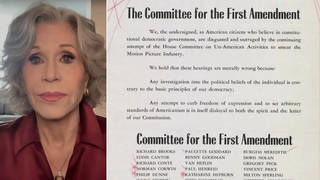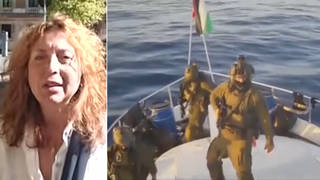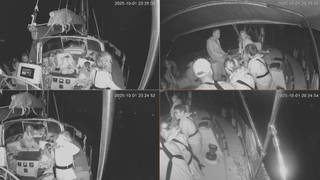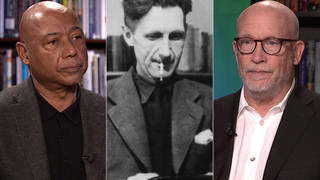
“My Name is Rachel Corrie” — a play based on the life of the late US peace activist who was killed by an Israeli bulldozer–was scheduled to open last March at the New York Theatre Workshop. But six weeks before opening night, the theater announced it was indefinitely postponing the production. The move that was widely criticized as an act of censorship. On Sunday, the play finally opened at the Minetta Lane Theatre in New York. We play exclusive excerpts of the play, and speak with Rachel Corrie’s father, Craig; her sister, Sarah; and the play’s co-editor, Katharine Viner. [includes rush transcript]
Rachel Corrie was killed in Gaza three years ago when she stood in front of an Israeli bulldozer set to demolish a Palestinian home. The play is based on Corrie”s writings before her death.
“My Name is Rachel Corrie” was scheduled to open last March at the New York Theatre Workshop. But six weeks before opening night, the theater announced it was indefinitely postponing production of the play. They cited the current political climate as the reason for the cancelation, pointing to Prime Minister Ariel Sharon”s coma and the election of Hamas.
The move was widely criticized by artists and activists all over the world. At the time, we had a debate on Democracy Now and I read a letter written by Nobel laureate Harold Pinter to the artistic director of the New York Theatre Workshop James Nicola and the theater”s managing director, Lynn Moffat. The co-editor of the play, Katherine Viner, joined us from London.
- Katharine Viner. Co-editor of the play My Name is Rachel Corrie. She is also an editor at the London newspaper The Guardian.
- Craig Corrie. Rachel Corrie’s father.
- Sarah Corrie. Rachel Corrie’s older sister.
- Excerpts from “My Name is Rachel Corrie.”
- Excerpt of the documentary, “Rachel Corrie: An American Conscience.” It was directed by Yahya Barakat.
Transcript
AMY GOODMAN: This past Sunday, the play, My Name is Rachel Corrie, finally opened in the United States, here in New York at the Minetta Lane Theatre.
MEGAN DODDS, as RACHEL CORRIE: This realization that I will live my life in a world where I have privileges. I can’t cool boiling waters in Russia. I can’t be Picasso. I can’t be Jesus. I can’t save the planet single-handedly.
AMY GOODMAN: Rachel Corrie was killed in Gaza on March 16, 2003, nearly three years ago, when she stood in front of an Israeli bulldozer set to demolish a Palestinian home. The play is based on Rachel Corrie’s writings before her death. My Name is Rachel Corrie was scheduled to open last March at the New York Theatre Workshop, but six weeks before opening night the theater announced it was indefinitely postponing production of the play. They cited the current political climate as the reason for the cancellation, pointing to Prime Minister Ariel Sharon’s coma and the election of Hamas. The move was widely criticized by artists and activists around the world.
At the time, we had an exclusive debate on Democracy Now!, and I read a letter written by Nobel laureate Harold Pinter to the artistic director of the New York Theatre Workshop, James Nicola, and the theater’s managing director, Lynn Moffat. The co-editor of the play, Katharine Viner, joined us on the line from London.
AMY GOODMAN: There’s a letter today in The New York Times. It’s written by Harold Pinter, who is the Pulitzer Prize-winning writer, Gillian Slovo, Stephen Fry, and it’s dated March 20. The letter was signed by 18 others, and it says, “We are Jewish writers who supported the Royal Court production of My Name Is Rachel Corrie. We are dismayed by the decision of the New York Theatre Workshop to cancel or postpone the play’s production. We believe that this is an important play, particularly, perhaps, for an American audience that too rarely has an opportunity to see and judge for itself the material it contends with.
“In London it played to sell-out houses. Critics praised it. Audiences found it intensely moving. So what is it about Rachel Corrie’s writings, her thoughts, her feelings, her confusions, her idealism, her courage, her search for meaning in life — what is it that New York audiences must be protected from?”
The letter goes on to say, “The various reasons given by the workshop — Prime Minister Ariel Sharon’s coma, the election of Hamas, the circumstances of Rachel Corrie’s death, the 'symbolism' of her tale — make no sense in the context of this play and the crucial issues it raises about Israeli military activity in the Occupied Territories.”
And the final line of the letter says, “Rachel Corrie gave her life standing up against injustice. A theater with such a fine history should have had the courage to give New York theatergoers the chance to experience her story for themselves.” Signed Gillian Slovo, Harold Pinter, Stephen Fry, London, March 20, 2006. Harold Pinter this year won the Nobel Prize for Literature.
Our guests, Lynn Moffat is managing director of the New York Theatre Workshop, in our studio with Jim Nicola, artistic director; and in the London studio, Katharine Viner, co-editor and co-producer of My Name is Rachel Corrie. Lynn Moffat, your response to the letter?
LYNN MOFFAT: To the letter? It’s a beautiful letter. It actually addresses the issues that we were concerned about. We believe in Rachel’s voice, as they believe in Rachel’s voice. We want it heard by a New York audience, but we want the voice heard by the New York audience, not the ancillary events that can pollute that voice. So that is the purpose of the methodology that New York Theatre Workshop employs when it uses — when it develops context for a play. I know “context” has become a much maligned word in the last few weeks, but that is what we do, because ultimately the purpose of the workshop in producing art is to foster community dialogue, and to do that requires a lot of work just beyond the play that is seen on stage.
AMY GOODMAN: But now, you did agree to produce the play, and it was going to have its opening night tonight?
LYNN MOFFAT: And we still want to produce the play.
JAMES NICOLA: Yep.
LYNN MOFFAT: We still want to produce the play, and the word “indefinite,” we don’t know where that word came from. We really — and we never canceled the play. We were having a conversation with our colleagues at the Royal Court about the difficulties that we were having, not only just with the research that we were doing about the project and about the play, but also about, you know, contracts and budgets and fundraising, and all that sort of stuff.
JAMES NICOLA: Visas.
LYNN MOFFAT: Visas. We were having a conversation with them, and then Katharine’s letter appeared in the Guardian.
AMY GOODMAN: Katharine Viner, your response.
KATHARINE VINER: Yeah. I mean, I’m actually not a co-producer of the play. I was just the co-editor, so — but as I understand it, we had everything set. Our tickets — our flight tickets were booked. I was due to fly out yesterday to New York. The production schedule was finalized. Both sides of the Atlantic had agreed on a press release that was going to go out to the press, announcing the production of My Name is Rachel Corrie, and then the Royal Court, as I was told, received a telephone call saying that the play was to be postponed indefinitely. That’s where the phrase came from.
AMY GOODMAN: Katharine Viner, speaking on Democracy Now! in March. She joins us now in our firehouse studio. She is the co-editor of My Name is Rachel Corrie, also an editor at the London newspaper, The Guardian, also joined by Rachel’s father and sister, Craig and Sarah. We welcome you all to Democracy Now! As you watch that, Katharine Viner, you were speaking to us from London, had planned to be in New York at the time, and yet, here you are, and the play is being shown now at the Minetta Lane Theatre. What happened?
KATHARINE VINER: Well, we’re so delighted that it’s finally on — the play is finally on in New York. We always said that it’s an American play. Rachel was always just wholly American and should be heard here, and I think it just shows that the whole controversy was needless. The play has been very well received. Ticket sales are sort of through the roof. Word of mouth is fantastic, and it just shows that New York wanted to see this play all along.
AMY GOODMAN: Sarah, you’re a key part of this play. You are [Rachel]'s older sister, and you're the person who started this process of collating your sister’s emails. Can you talk about that process?
SARAH CORRIE: Yes, actually we received an email from the Royal Court Theatre shortly after Rachel was killed, asking if they could do some sort of a work based off of Rachel’s emails. And at the time it was just too emotional for us to be going through Rachel’s writing. We knew there was a vast amount of material there, but it also felt very important to us. Rachel was a writer. She had always wanted to be published. I think it was one of the dreams that she had, and so I felt like it was something that I could give back to my sister in order to sort of allow that part of her life to still move forward.
So it was approximately a year after we first got the email from the Royal Court Theatre that I sat down and was able to sit down with Rachel’s journals. She was — in the play, she describes herself as a very messy girl, so these journals were in tubs, they were in closets, they were in places all over the house.
AMY GOODMAN: You live in and she grew up in Olympia, Washington?
SARAH CORRIE: In Olympia, Washington, and we actually both lived together. She had moved back into the house that we grew up in, with my husband and I, and lived together for the last four months before she went over to Rafah, so she was living in the home with my husband and I at that time. So I was able to sit down with those journals. I’d take an evening to just look at the journals, read them, gain sort of the emotional need that I had for myself to understand the context, and then the next day, I sat down with a glass of wine next to me and just typed them out without trying to edit anything, sort of like a secretary would, just to get the words down on paper, and that is what became the text that we then sent to the Royal Court for editing at that time.
AMY GOODMAN: I watched the play last night at the Minetta Lane Theatre, and afterwards you all spoke. You talked to the audience and answered questions. And one of the key parts of this play is the list that Rachel makes. Can you talk about the process of going through these and deciding whether on earth the Royal Court Theatre would be interested in Rachel’s lists, like when she’s going to do her laundry?
SARAH CORRIE: Yes. Rachel throughout all her writing had these sort of what most people would look at, say these are odd little lists, but interesting in a way, and I’d see this things within her writing and look at them and say, “Well, what possibly could somebody do with these?” But at the same time, they struck my interest. I don’t consider myself a writer. I don’t consider myself someone that would be good at creating a piece of theater, and I told myself, I don’t have the right to edit that out. They were interesting to me, and so I ended up just typing them up along with everything else, putting them in, and then that became sort of the piece that wove the different aspects of the play together.
AMY GOODMAN: Katharine Viner, you are careful to say you’re not the playwright here, but that you co-edited Rachel’s letters. What about these lists? Can you talk about them, and for people who don’t understand what we mean by lists? What’s on these lists?
KATHARINE VINER: Well, some of the lists are sort of “five people I wish I’d met who are dead,” or “five people to hang out with in eternity,” and that was very entertaining. Some lists are quite sort of functional, but actually convey something very revealing. So there may be a list about tasks to do in Gaza, which sort of showed you what life is like under occupation, just from a list. And it was interesting when we were editing the play, how they worked dramatically, these lists, because it became a kind of recurring motif for, somehow, something you knew about Rachel, that she loved making these lists, and you could chart her sort of psychological progress through these lists and how they developed while she was there. They also worked really well on stage, I think, and the audience gets very involved in them.
AMY GOODMAN: So, the people she wanted to see who are dead. Jesus?
KATHARINE VINER: Jesus, E.E. Cummings, Gertrude Stein, Martin Luther King, Josephine — a selection of those anyway, wasn’t it?
AMY GOODMAN: Well, this is an excerpt from My Name is Rachel Corrie. In this scene, Rachel sits down and reads an email from her father.
MEGAN DODDS, as RACHEL CORRIE: Rachel, I find writing to you hard, but not thinking about you impossible, so I don’t write, but I do bore my friends at lunch, giving vent to my fear. I am afraid for you, and I think I have reason to be, but I am also proud of you, very proud. But as Don Remfert says, I’d just as soon be proud of somebody else’s daughter.
AMY GOODMAN: An excerpt of the play, My Name is Rachel Corrie. Craig, as you listen to that, your daughter, Rachel, reading your letter. Do you remember writing that email?
CRAIG CORRIE: Oh, yes. Chills are going down me right now. I had such a hard time. That’s the only email I wrote to Rachel while she was in Rafah. I’m a Vietnam vet, and when I was in Vietnam, of course, Cindy and I, my wife and I, were corresponding by mail, and that was easy for me, but I think it was hard for her. And I was learning from Rachel being over there that it was hard, because I didn’t know how she was. We were talking by telephone, and so when she was on the telephone I knew that she was okay for that period of time, but I was so worried about Rachel after she got over there.
When she started reporting about what she saw, the bullet holes next to the windows and stuff, I became extremely frightened for her, because I recognized, this is a military that’s out of control, and I know how much effort I spent in Vietnam to keep the people around me in control and understanding that the other people there are human beings, and I didn’t see anything about what Rachel was reporting that indicated that, so I became frightened that somebody would just needlessly harm her or the people that she was with.
And so, I finally got the nerve to write this email to her, and so it always chokes me up, because I had not envisioned her reading this email until I saw Megan doing it on the play, and then it’s — her reply is the last thing that we ever heard from Rachel, and so her reply in an email back to me, that’s our last contact with Rachel.
AMY GOODMAN: I wanted to go now to another clip, to Rachel Corrie in her own words. This is actually not from the play. This is an excerpt of the documentary, Rachel Corrie: An American Conscience, which was directed by Yahya Barakat. It includes excerpts of Rachel speaking in Gaza about the plight of the Palestinian people.
RACHEL CORRIE: Sometimes it takes awhile for it to set in what is happening here, because I think many of the people here, they try to maintain what they can of their lives, and I think — I don’t know — maybe it has to do with protecting their children, that they try to be happy, joke with their children. So sometimes it takes time to — it’s hard to hold in your mind, you know, the complete reality of what’s happening here. Sometimes I’m sitting down to dinner with people, and I just realize that there is a massive military machine surrounding them and trying to kill these people that I’m having dinner with, these families that I’m sitting down to eat with and who are being very generous and kind to me, and their children here, who are incredibly threatened, living lives that no child ever should have to live. And so, I feel a lot of horror. Really, I feel a lot of horror about the situation.
AMY GOODMAN: Rachel Corrie being interviewed in Gaza. Craig, when was this?
CRAIG CORRIE: That was two days before Rachel was killed, and I’d just like to take people’s attention to the scene behind Rachel. That used to be a neighborhood. She was on Abu Jamil’s house. Abu Jamil no longer has a house, and, of course, Rachel is no longer alive. But that’s the destruction that’s going on and was going on in Gaza.
AMY GOODMAN: The Israeli military bulldozer that crushed her — you are suing a U.S. company, Caterpillar, that made that bulldozer. Where does that suit stand?
CRAIG CORRIE: Well, of course, in the first place, that suit is predicated on the fact that Caterpillar knew that the bulldozers that they were supplying to the Israeli military were used to aid and abet in human rights violations. But at this point, the case actually has been dismissed, and it was filed in Weston, Washington, in the U.S. Superior Court in Weston, Washington, and the judge dismissed that and, I think, relied — I am not a lawyer, but he relied on a misinterpretation of U.S. law, because essentially, under this judge’s interpretation, unless the corporation, Caterpillar, actually profited from the actual human rights violation, they can’t be held accountable.
So if, for instance, I was in McDonald’s and somebody comes in and starts shooting in McDonald’s, runs out of bullets, and I sell them more bullets, I still wouldn’t be responsible for that person’s actions after they start to shoot again. So, of course, we’ve appealed that to the Ninth Circuit. And the appeals have been filed, but oral arguments in front of the Ninth Circuit have not yet occurred.
AMY GOODMAN: Finally, Sarah, to see this play — I was watching you. I was watching your family watch the play last night at the Minetta Lane Theatre. Is it a little bit like your sister is brought back to life?
SARAH CORRIE: No. It can never be Rachel up there on the stage, and I think when we first saw the play, we realized that. We weren’t expecting it to be Rachel on the play, but it’s a very accurate and honest view, I think, of what Rachel was feeling at that time, I mean, the person that she is. So, yes, I mean, it’s difficult as a family to watch. I think every family member that’s been there to see that play says for exactly that reason it’s difficult to watch the play, because Rachel’s not with us and you’re seeing somebody up on the stage bringing her words back to life and bringing her — a little bit of her personality and her humor back to life. And those are the kinds of things that you miss so much on just a day-to-day basis. So it is. It’s very difficult, but it’s also very warming at the same time to just have those words, either reading them to ourselves or up there on the stage. It — you know, it keeps Rachel with us just a little bit longer.
AMY GOODMAN: Well, I want to thank you all for being with us. Again, the play, My Name is Rachel Corrie, is now being performed at the Minetta Lane Theatre in New York. Sarah and Craig Corrie, thank you. Katharine Viner, thanks for joining us.













Media Options